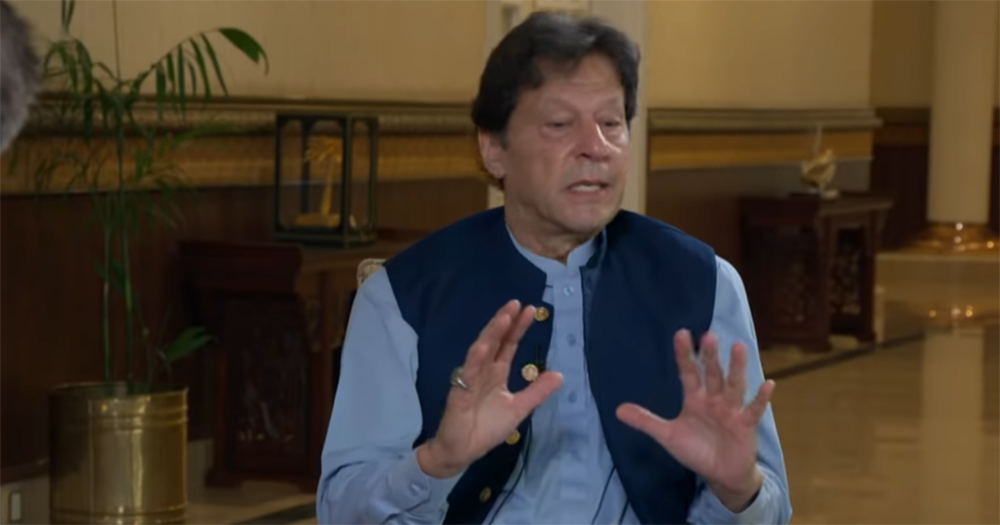Pakistan's Prime Minister Imran Khan has created a stir in an interview with Axios HBO broadcasted on June 21.
He was interviewed by Jonathan Swan, who gained prominence after his interview with then-President Donald Trump in Aug. 2020.
Donald Trump's wild interview with @axios, as told by @jonathanvswan's excellently expressive face https://t.co/VD0tgNWxAa pic.twitter.com/cHEQdgNO8R
— Sam Clench (@SamClench) August 4, 2020
When asked by Swan why he was so outspoken on Islamophobia in Europe and the U.S. but silent on the "genocide" of Muslims in Western China, Khan replied, "What our conversations have been with the Chinese, this is not the case, according to them."
When Swan said that the evidence was "overwhelming," citing reports of over a million Uyghurs being imprisoned, punished for professing their faith, forcibly sterilised, and the destruction of mosques, Khan added:
"Whatever issues we have with the Chinese, we speak to them behind closed doors. China has been one of the greatest friends to us in our most difficult times.
When we were really struggling, our economy was struggling, China came to our rescue.
So, we respect the way they are. And whatever issues we have, we speak behind closed doors."
Khan: It is hypocritical of the West to focus on Xinjiang because Kashmir is a bigger issue
This led to Khan's own question to Swan, in which he asked why the matter was such a "big issue" in the West.
Khan said:
"Why are the people of Kashmir ignored? It is much more relevant compared to what might be going in...the Uyghurs. Hundred thousand Kashmiris have been killed.
There are 800,000 Indian troops which have...literally, it's an open prison in Kashmir. 9 million Kashmiris are put there. Why is that not an issue? I think it's hypocrisy."
In response, Swan asked if Khan felt "sick" to be quiet about the Xinjiang issue, as a result of the amount of money from China coming into Pakistan.
To this, Khan cited Palestine, Libya, Somalia, Syria and Afghanistan, and asked if he should start "talking about everything."
The Prime Minister then replied, "I concentrate on what is happening on my border in my country."
This drew Swan's reply, "This is on your border."
Khan focused on Kashmir
Khan then clarified, "No, that is part of Pakistan. A hundred thousand Kashmiris are dying, that concerns me more. Because half of Kashmir is in Pakistan."
Kashmir, a Muslim-majority region in the north of both India and Pakistan has been partitioned between the two countries since 1947, and has been a major source of tension since, according to Vox.
Both countries claim the region in its entirety.
When Swan added that the repression of the Uyghurs was "a grotesquely large human rights atrocity," Khan interjected:
"First of all I'm not sure about that because of our conversations with the Chinese, this is not the picture that comes from that side."
Swan then pressed Khan to clarify with Khan if he was "not in any way" concerned about the Muslims Uyghurs in Xinjiang.
Khan reiterated his answer, "Our discussion with Chinese will always be behind closed doors."
A sharp contrast with his stance on Muslims in Western countries
Part of the reason why Khan's comments have been considered controversial is due to the outspoken stance he has taken on issues of Islamophobia in Western countries.
In Oct. 2020, UAE media Khaleej Times reported that Khan had written a letter to leaders of Muslim countries, urging collective action against "growing Islamophobia", particularly in Western countries.
My letter to leaders of Muslim states to act collectively to counter the growing Islamophobia in non-Muslim states esp Western states causing increasing concern amongst Muslims the world over. pic.twitter.com/OFuaKGu2c1
— Imran Khan (@ImranKhanPTI) October 28, 2020
And in Nov. 2020, an Islamist group in Pakistan called off protests after it said that the country had endorsed a boycott of French goods, in the wake of a French teacher who was beheaded for showing cartoons about the Prophet Muhammad, the BBC reported.
Axios further noted that Pakistan has kept mum on China's repression of the Uyghur minority however, supposedly as a result of the country's increasing financial dependence on its neighbour for billions in loans and investment.
However, Axios alleges, the price of such loans are the silence of the country on such issues to avoid incurring China's displeasure.
Chinese media slams Axios for "patronising" interview of Khan
In the meantime, CGTN, the English-language arm of China's state broadcaster CCTV, has slammed the interview of Khan as "patronising and insulting."
The piece accused of Axios of "fundamentally" misrepresenting Khan's position on Xinjiang to push "its own anti-China political agenda."
It also took umbrage at the statement that China had bought Khan's silence with loans and investment, adding that the depiction of the countries' relationship was "patronising, insulting and outright false," given that both countries had built their ties on a common postcolonial and developing world solidarity.
Echoing Khan somewhat, the piece added that the issue of Xinjiang is "peddled by the West in highly politicised and moralistic jargon."
It added that Pakistan understood China's own position on Xinjiang which sees the matter primarily through the lens of stability and counter-terrorism, following decades of unrest.
Related stories:
Top image screenshot from Axios HBO YouTube
If you like what you read, follow us on Facebook, Instagram, Twitter and Telegram to get the latest updates.
